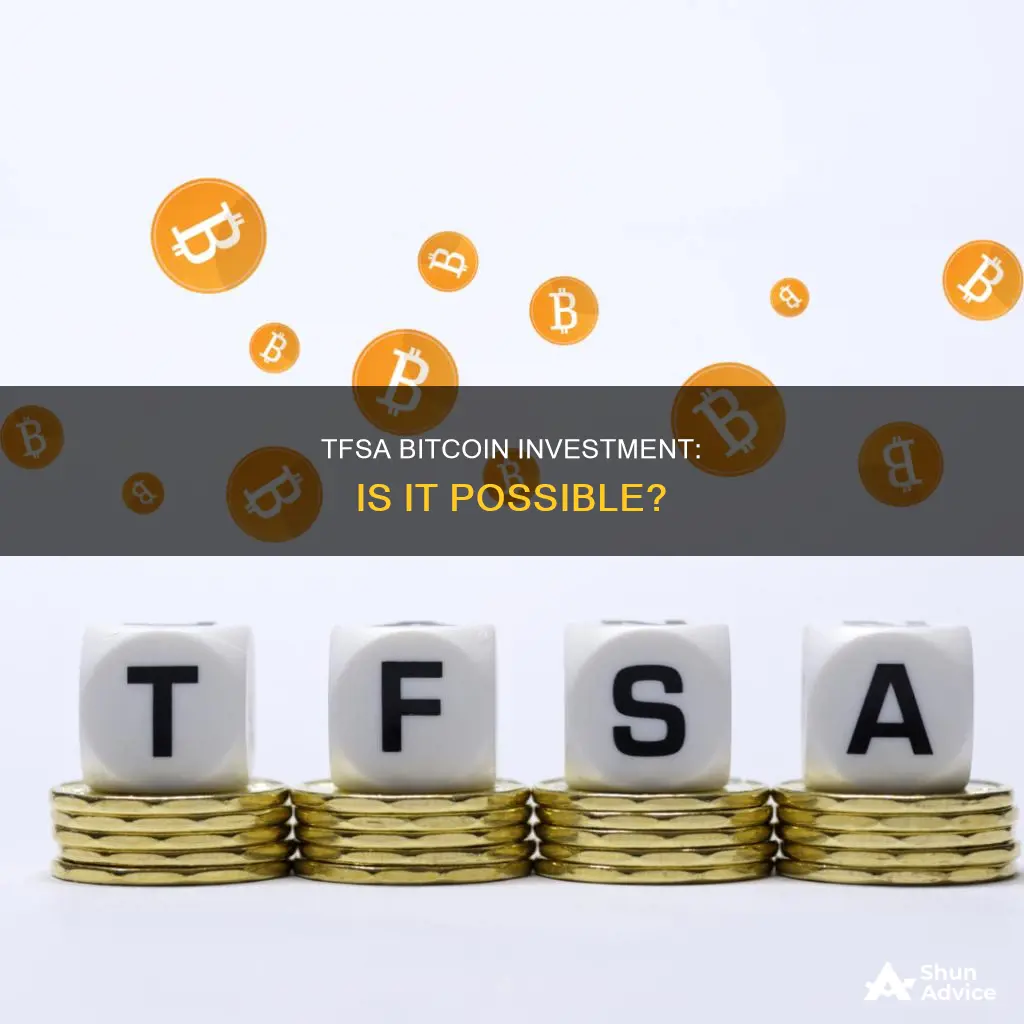
Bitcoin has been a hot topic since its massive run-up in 2017, and its popularity has only grown since. As a result, many investors are now looking for ways to gain exposure to the cryptocurrency market, including through Tax-Free Savings Accounts (TFSAs). While it is not possible to buy Bitcoin directly in a TFSA, there are alternative ways to gain exposure to Bitcoin in these accounts. One way is to invest in Exchange-Traded Funds (ETFs) that invest in Bitcoin, such as the Purpose Bitcoin ETF (BTCC) or The Bitcoin Fund (QBTC). Another option is to invest in Bitcoin mining companies, such as BitFarms (BITF) or HIVE Blockchain Technologies (HIVE), which offer leveraged exposure to Bitcoin. These investments can be held in a TFSA and offer a way to gain exposure to the cryptocurrency market while also providing potential tax benefits. However, it is important to remember that Bitcoin and the broader cryptocurrency market are highly volatile and carry significant risks.
| Characteristics | Values |
|---|---|
| Is it possible to invest in Bitcoin through TFSA? | Yes, but not directly. You can buy Exchange-Traded Funds (ETFs) that invest in Bitcoin. |
| How to invest in Bitcoin through TFSA? | You can open a self-directed investment account through a bank or investment service, create an RRSP or TFSA account within that account, and then transfer your existing RRSP/TFSA to that account. From there, purchase shares of QBTC. |
| What are the risks of investing in Bitcoin through TFSA? | Cryptocurrency is a high-risk, speculative, and incredibly volatile asset. If Bitcoin goes to zero, there is no protection for investors. |
| What are the benefits of investing in Bitcoin through TFSA? | The new Bitcoin ETF lets you buy Bitcoin in both registered and unregistered accounts, meaning you can tax-shelter your investment in a TFSA or RRSP. |
What You'll Learn

Bitcoin ETFs are available on the Toronto Stock Exchange
Bitcoin ETFs on the Toronto Stock Exchange
The Toronto Stock Exchange (TSX) approved the world's first bitcoin exchange-traded fund (ETF) in February 2021. The Purpose Bitcoin ETF (BTCC) is the first direct custody bitcoin ETF in the world, allowing investors to invest directly in physically settled bitcoin. It is traded on the TSX under three ticker symbols: BTCC (CAD and currency-hedged), BTCC.B (CAD and non-currency hedged), and BTCC.U (USD and non-currency hedged). The ETF has a 1% management fee and is eligible for registered accounts such as TFSA and RRSP.
Since the launch of the Purpose Bitcoin ETF, several other Bitcoin ETFs have become available on the TSX, including:
- Evolve Bitcoin ETF (EBIT)
- CI Galaxy Bitcoin ETF (BTCX)
- 3iQ CoinShares Bitcoin ETF (BTCQ)
- NinePoint Bitcoin ETF (BITC)
These Bitcoin ETFs provide investors with a simpler and more secure way to gain exposure to Bitcoin compared to buying and holding the cryptocurrency directly. They are also eligible for registered accounts, allowing investors to tax-shelter their capital gains. However, it is important to note that Bitcoin is a highly volatile and risky asset, and investors could lose all their investments.
Protecting Your Bitcoin: Coinbase's Security Measures
You may want to see also

You can't buy Bitcoin directly with a TFSA
While you can hold bitcoin in a TFSA, it's not possible to buy it directly with one. This is because cryptocurrency is not yet mainstream enough to be able to purchase it directly in your brokerage account. Traditional banks and brokerages do not fully recognize Bitcoin and other cryptocurrencies as legitimate currencies. As a result, you cannot buy Bitcoin directly in registered accounts like the TFSA or RRSP.
However, this doesn't mean that you can't gain exposure to Bitcoin through your TFSA. There are a few ways to do this.
Exchange-Traded Funds (ETFs)
One way to invest in Bitcoin through your TFSA is to buy Exchange-Traded Funds (ETFs) that invest in Bitcoin. ETFs are investment securities that trade on the market exchange like a single stock. The Toronto Stock Exchange recently approved the first bitcoin ETF in North America, the Purpose Bitcoin ETF (BTCC.TO), which is traded on the Toronto Stock Exchange. This ETF is invested solely in bitcoin, making it easier for the average investor to take a position in Bitcoin.
Bitcoin Mining Stocks
Another way to gain exposure to Bitcoin through your TFSA is to invest in Bitcoin mining stocks. These are companies that own and operate server farms that generate new Bitcoins. An example of such a company is HIVE Blockchain Technologies (TSXV:HIVE), which has seen incredible gains in recent years. Investing in a Bitcoin mining stock allows you to invest in the cryptocurrency industry without purchasing Bitcoin directly.
Online Brokerages
You can also use online brokerages like Wealthsimple Trade and Questrade to invest in Bitcoin without using a TFSA. These platforms offer low-commission or commission-free trading, making it more affordable to invest in Bitcoin directly.
Bitcoin Investment: Is It Too Late to Invest?
You may want to see also

You can buy Bitcoin ETFs in a TFSA or RRSP
While you can't hold Bitcoin in a Tax-Free Savings Account (TFSA) or Registered Retirement Savings Plan (RRSP), you can buy Exchange-Traded Funds (ETFs) that invest in Bitcoin.
The Toronto Stock Exchange recently made history by approving the first Bitcoin ETF in North America. This means that investors can now purchase shares in tax-sheltered accounts like a TFSA or RRSP. This allows investors to tax-shelter their capital gains in cryptocurrency.
The Purpose Bitcoin ETF (BTCC.TO) is the first cryptocurrency ETF to be approved in Canada and trade on the Toronto Stock Exchange. The fund charges a 1% management fee and is invested solely in Bitcoin.
If you want to buy Bitcoin in your TFSA or RRSP, you'll need a TFSA or RRSP brokerage account to access the stock market. Wealthsimple Trade and Questrade both offer excellent low-commission trading platforms, and it’s free to buy ETFs on both. Simply open a TFSA or RRSP trading account with your brokerage of choice, and purchase shares of BTCC.TO when the market opens.
Risks
While the new Bitcoin ETF makes it easier than ever to invest in Bitcoin, it doesn't eliminate the risks of investing in cryptocurrency. Cryptocurrency is still a high-risk, speculative asset that is incredibly volatile. Despite its popularity, it can still rapidly decline in value.
Capital losses in registered accounts like the RRSP or TFSA are also a concern because they can impact the contribution room. If you gamble in your TFSA or RRSP and the investment goes south, that money is gone forever. An investment loss is not the same as a withdrawal, and you don't recoup the contribution room the following year.
It's also worth noting that you can only trade BTCC during market hours. Cryptocurrency never sleeps, and many big run-ups or crashes happen outside of traditional trading hours. If you're looking to actively trade Bitcoin, you may find doing so with shares of an ETF extremely limiting.
Which Educational Institutions Embrace Bitcoin?
You may want to see also

Cryptocurrency is not recognised as a legitimate currency by traditional banks
Cryptocurrency: Not Recognised by Traditional Banks
Cryptocurrency is a digital or virtual currency that is secured by cryptography, making it nearly impossible to counterfeit or double-spend. Cryptocurrencies are created and held electronically, and they are not controlled by any central authority, unlike traditional currencies. This lack of centralised control is one of the key reasons why traditional banks do not recognise cryptocurrency as a legitimate currency.
No Central Authority
Cryptocurrencies are not issued by any central authority, such as a government or monetary institution. Instead, they are created and held electronically on a decentralised network, typically using blockchain technology. This means that cryptocurrencies exist outside the control of governments and central banks, and their value is determined solely by market forces of supply and demand.
Volatility
The value of cryptocurrencies is highly volatile and subject to rapid surges and crashes. For example, the price of Bitcoin increased from US$30,000 in mid-2021 to almost US$70,000 towards the end of 2021, before falling to around US$35,000 in early 2022. This volatility is due to the speculative nature of cryptocurrencies, which are often treated as assets for investment rather than as currencies for transactions.
Regulatory Issues
The regulatory status of cryptocurrencies is still evolving, and they are not widely accepted or recognised as a legitimate means of payment by traditional banks and financial institutions. In some countries, like China, cryptocurrency exchanges and transactions are banned altogether. In others, like the United States, regulatory agencies are slowly gaining ground in the industry. The lack of clear and consistent regulation across jurisdictions makes it difficult for traditional banks to recognise cryptocurrencies as legitimate.
Criminal Activities
Cryptocurrencies have become popular tools for criminal activities, such as money laundering, illicit purchases, and ransomware. The anonymous and decentralised nature of cryptocurrencies makes it difficult to track and regulate these criminal activities. This has led to concerns about consumer protection and financial integrity, which are key considerations for traditional banks when recognising a currency.
Environmental Concerns
Cryptocurrency mining, the process of verifying transactions and creating new units of a cryptocurrency, requires a significant amount of computing power and energy. The energy consumption associated with cryptocurrency mining has led to concerns about the environmental impact of these digital assets. Traditional banks, which are increasingly focusing on sustainability and ESG (Environmental, Social, and Governance) factors, may be hesitant to recognise cryptocurrencies as legitimate due to these environmental concerns.
In conclusion, while cryptocurrency has gained popularity and acceptance in recent years, it is not recognised as a legitimate currency by traditional banks due to its lack of centralised control, volatility, regulatory issues, association with criminal activities, and environmental impact. However, as the world of digital assets continues to evolve, traditional banks may need to re-evaluate their stance and find ways to adapt to the changing landscape of finance and payments.
Doge Coin: Worth the Investment Risk?
You may want to see also

Bitcoin is highly volatile
Bitcoin is a highly volatile cryptocurrency. Its price can rise or fall by thousands of dollars in a single day. This volatility is driven by several factors, including supply and demand, investor and user sentiments, government regulations, and media hype.
Supply and Demand
Bitcoin's market value is influenced by the number of coins in circulation and how much people are willing to pay. With a limited supply of 21 million coins, the closer the circulating supply gets to this limit, the higher the prices are likely to climb. As big financial players compete for ownership in a dwindling supply, Bitcoin's price will likely fluctuate in response to their actions.
Investor Actions
As the most popular cryptocurrency, Bitcoin demand increases as supply becomes more limited. Long-term, wealthier investors hold their Bitcoins, preventing those with fewer assets from gaining exposure. According to the National Bureau of Economic Research, one-third of all Bitcoins were held by the top 10,000 investors at the end of 2020. The number held by institutions and large investors will likely keep rising as long as belief in the cryptocurrency's staying power and profitability remains strong.
Bitcoin volatility is also driven by these investors, known as "Bitcoin whales". It is unclear how they would liquidate their significant positions without affecting Bitcoin's market price. If they were to suddenly sell their holdings, prices would plummet as other investors panicked and followed suit.
Sentiments, Media Hype, and Regulations
Fear and greed are primary drivers of Bitcoin volatility. Investors fear missing out on big upswings or falling victim to large downswings, leading to panic buying or selling, which influences demand and prices. Media outlets, influencers, and industry moguls also create investor concerns, leading to price fluctuations.
News and media outlets often present unverified information and predictions from "experts", which may be self-serving. For example, when Proshare's Bitcoin Strategy ETF was announced in October 2021, Bitcoin's price skyrocketed, but then dropped when investors realised the ETF was linked to Bitcoin through futures contracts.
Government regulations can also impact Bitcoin's price. For instance, China's 2021 ban on cryptocurrency transactions and mining led to a significant drop in Bitcoin's value.
Immaturity of the Bitcoin Market
Bitcoin is still a nascent asset class, and its price is in the discovery phase. This means that prices will continue to change as investors, users, and governments work through the initial growing pains and concerns. As a new form of value, the terminal value of Bitcoin is still undefined, and its price is driven by momentum or technical factors rather than business prospects, earnings, or cash flow.
Bitcoin vs Cardano: Which Crypto is the Better Investment?
You may want to see also
Frequently asked questions
Yes, you can invest in Bitcoin through a Tax-Free Savings Account (TFSA). However, you cannot hold Bitcoin directly in your TFSA. You can buy Exchange-Traded Funds (ETFs) that invest in Bitcoin, such as the Purpose Bitcoin ETF (BTCC) or The Bitcoin Fund (QBTC).
Investing in Bitcoin through a TFSA allows you to tax-shelter your capital gains in cryptocurrency. You can also buy and sell Bitcoin easily through your regular brokerage account, without the hassle and security concerns of using a separate cryptocurrency trading platform.
Bitcoin is a highly volatile and speculative investment, and there is a risk of losing your entire investment if the value of Bitcoin drops. Additionally, investing in Bitcoin through a TFSA may limit your ability to actively trade, as doing so could be considered business activity and subject you to taxes.







